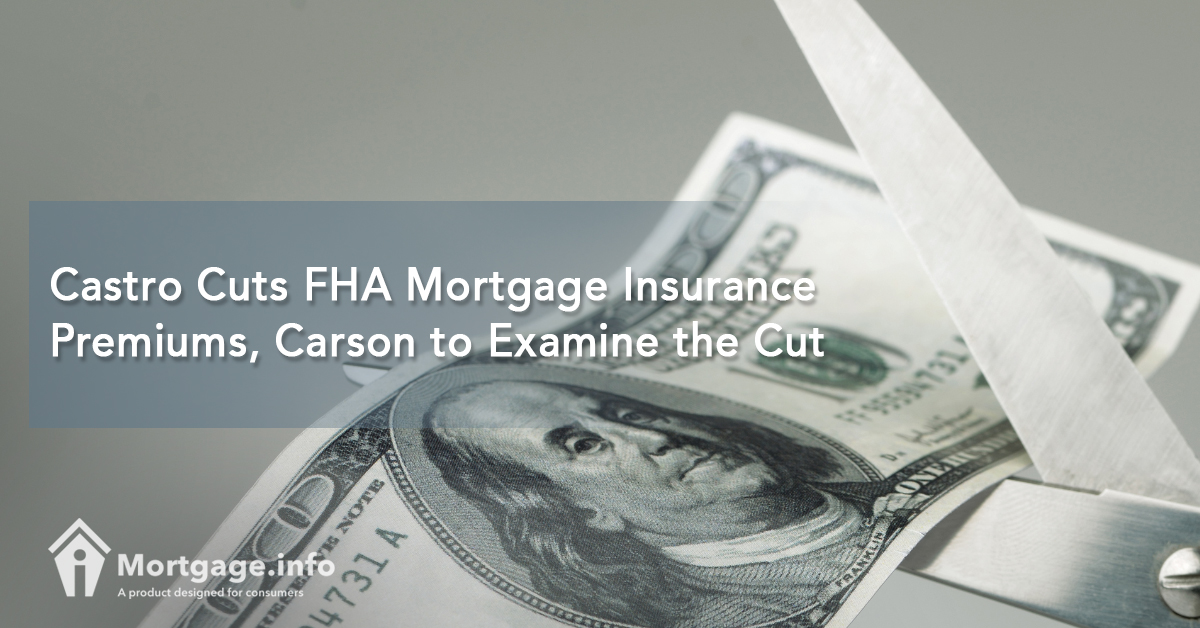
Outgoing secretary of the Housing and Urban Development Julian Castro announced earlier that FHA’s annual mortgage insurance premiums have been lowered. This move, according to Sec. Castro, will generate annual savings of $500 to households. But some members of the Republican party were not too happy with the Obama administration’s parting gift. Ben Carson, who is President Trump’s nominee for the HUD post, said he will look into the insurance premium cut.
Lower FHA Annual Mortgage Insurance Premiums Starting Jan. 27
Good news for consumers who will be taking out FHA-insured mortgages for purchase and refinance. The FHA will reduce the annual mortgage insurance premium, the monthly component of its mortgage insurance, by at least 25 basis points.
Lowered annual MIP rates will be felt by borrowers whose mortgages closed on or after January 27. Under the revised mortgage insurance premium schedule, homebuyers and homeowners will be paying these amounts.
15-Year vs 30-Year Annual MIP Rates
Let’s start with mortgages taken out by most borrowers, the 30-year mortgages or mortgages whose terms are greater than 15 years.
- For loan amounts less than or equal to $625,500 with an LTV of less than or equal to 95%, the new MIP will be 55 bps, from the previous MIP of 80 bps.
- For loan amounts less than or equal to $625,500 with an LTV of greater than 95%, the new MIP will be 60 bps, from the previous MIP of 85 bps.
- For loan amounts greater than $625,500 with an LTV of less than or equal to 95%, the new MIP will be 55 bps, from the previous MIP of 100 bps.
- For loan amounts greater than $625,500 with an LTV of greater than 95%, the new MIP will be 60 bps, from the previous MIP of 105 bps.
For mortgages whose term is less than or equal to 15 years, the new annual mortgage insurance premiums will be 25 bps or 50 bps. The 25 bps is for loans with a base amount of less than or equal to $625,500 and an LTV of less than or equal to 90%. Loans with the same base amounts but have an LTV ratio greater than 90%, the new MIP is 50 bps.
For loans whose base amount is greater than $625,500 but with an LTV ratio of (a) less than or equal to 78%, the new MIP is 25 bps from 45 bps, (b) between 78.01% and 90.00%, the new MIP is 25 bps from 70 bps, and (c) greater than 90%, the new MIP is 50 bps instead of 95 bps.
The new annual MIP rates eliminate the distinction in rates for certain streamline and simple refinance transactions regardless of the base loan amount.
For example, homeowners with refi loans whose loan term is greater than 15 years with an LTV of less than or greater than 90%, the revised mortgage insurance premiums will be 55 bps. Homeowners with refi loans with terms of less than or equal to 15 years with LTV of less than or greater than 90%, the new MIP will be 25 bps.
Castro vs Carson
In a Jan. 9 press statement, Sec. Castro cited the improved economic health of the mutual mortgage insurance fund as the reason behind the insurance premium reduction. According to him, the MMI Fund has grown $44 billion in value since 2012, and the MMIF capital ratio by $3.8 billion in 2016 alone. The fund’s capital ratio is currently at 2.32%, exceeding its two-percent statutory capital ratio requirement.
“The FHA’s action,” said Sec. Castro, “reflects today’s risk environment and comes at the right time for consumers who are facing higher credit costs as mortgage interest rates are increasing.”
At his confirmation hearing for the HUD Secretary nomination on Jan. 12, Mr. Carson found the FHA’s lowering the mortgage insurance premiums as surprising. He also confirmed at the hearing that Sec. Castro nor anyone at HUD did not reach out to him regarding the matter.
“No, they did not. I too was surprised to see something of this nature done on the way out of the door which of course has a profound effect. We’re talking of $5,000,000,000 next year. That’s not chump change.”
“Certainly if confirmed, I’m going to work with the FHA administration and other financial experts to really examine that policy,” Mr. Carson said at the hearing whose transcript is accessible here.
Also during the hearing, Senator Pat Toomey commented that the capital ratio of 2.32% as “very little buffer” and referenced the FHA’s needing to be bailed out back in 2013.
In a press conference before the confirmation hearing, Sec. Castro said that the MMI Fund was healthy enough to support a premium cut, National Mortgage News reported. According to the same article, Mr. Carson was not consulted on the matter because according to Sec. Castro it was “market sensitive.”
Mr. Carson’s nomination is expected to receive approval from the Banking Committee, which is largely dominated by Republicans, per the Mortgage News Daily report.
